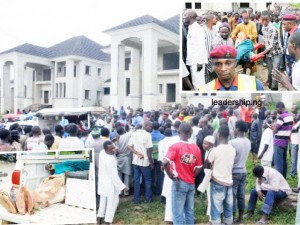The army Monday defended the killing of eight persons alleged to be suspected Boko Haram members during a military operation at Apo District of Federal Capital Territory on September 20.
Those killed were later identified as members of the National Commercial Tricycle and Motorcycle Owners and Riders
Association of Nigeria (NATOMORAS) who lived at the uncompleted building where they were killed because they could not afford the high cost of rent in the area.
Appearing yesterday in Abuja before a three-man panel of the National Human Rights Commission (NHRC) probing the extra-judicial killings, Chief of Army Staff, Lt Gen Azubuike Ihejirika, said the incident was an isolated case and was unfortunate.
He said the army acted promptly to avert what would have amounted to collateral damage in the Federal Capital Territory (FCT).
A non-governmental organisation, Global Rights and NATOMORAS had jointly filed a petition before the NHRC, urging it to probe the incident.
Ihejirika explained that the Apo incident was part of an ongoing military operation to rid the FCT of suspected Boko Haram members and ensure peace and stability in the country.
Ihejirika, who was represented by the Commander, Brigade of Guards Nigeria Army, Major Gen Emmanuel Atewe, the army chief said the operation in Apo was sequel to a report from the Department of State Security (DSS) alleging a planned attack by members of the Boko Haram on Abuja.
He said: “Between 18 and 19th of September, two persons were arrested in Abuja and they made useful confessions that there existed cache of arms hidden at Apo Cemetery to be used in a planned attack.”
According to him, it was based on the confessional statements of the suspects that the military went to the cemetery to uncover the weapons.
“It was in the night, the area was bushy and we could not navigate the cemetery and the suspects could not identify the actual spot where the weapons were buried. It was at that point the suspects said their leader, one Suleiman, if arrested would show the spot where the ammunition was hidden,” he added.
He explained that the suspects said Suleiman was residing in an uncompleted building in Apo, adding: “It was on that premise that the team cautiously moved to the uncompleted building to arrest Suleiman. But unfortunately, as troops were deploying to cordon the building, the fire came; first it was a single shot before rapid shots followed. Under self-defence, the troops returned fire.”
He said the DSS had cogent information on a planned attack on FCT, stressing that the operation was necessary to avert the plan.
“The military personnel operating in FCT are well trained in handling arms and have exercised restraint in the discharge of their duties. We have no reason to kill anybody dastardly or act under provocation.
“Apo is an isolated case and very unfortunate, the security agents acted proactively to prevent collateral damage that may have taken place in Abuja if the planned attack had taken place.
“The adversaries did firearm movement, they were firing as they escaped, a loaded magazine was found and from our records, it does not belong to the military,” Ihejirika said.
However, the Army hinted that Suleiman was still at large and the cache of arms at the Apo cemetery undiscovered.
“We have carried out 153 operations successfully, made arrests and did not shoot anybody,” he said to justify his description of the Apo incident as an isolated case.
Meanwhile, the panel has granted an application by the DSS to move its sitting to its headquarters in order to protect the identity of their witnesses.
Clifford Osagie and other officials of SSS cited security reasons for the application, adding that they have some exhibits to tender.
The panel adjourned until January 2014 for continuation of the case.





